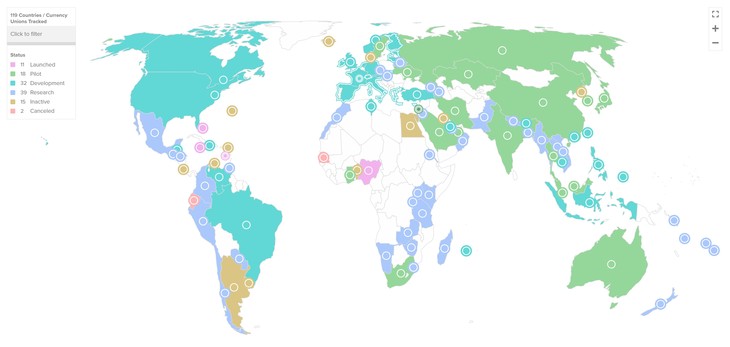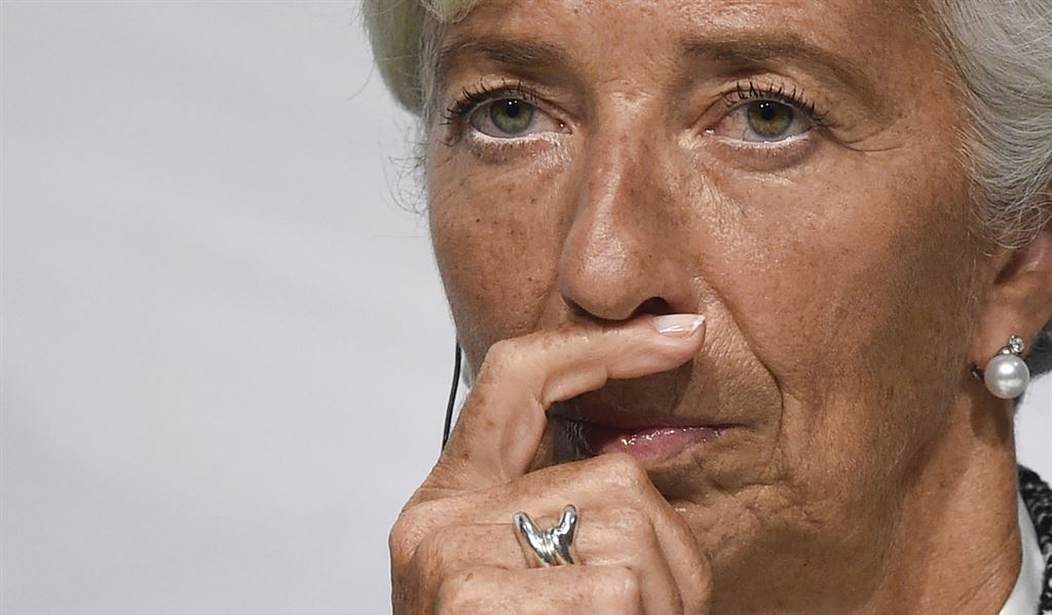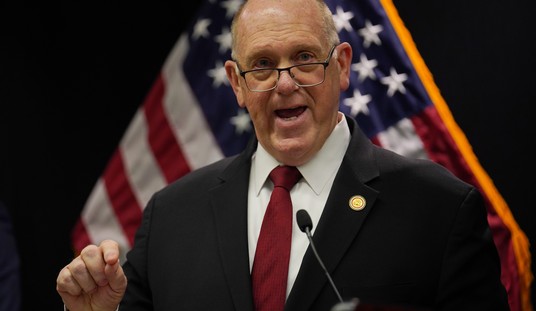Everyone gets to wear the clown nose at least once in their lives. Some people never take theirs off.
Last month the round red proboscis of “gotcha” came for Christine Lagarde, the European Central Bank president with a Saturday cartoon villain’s last name.
European Central Bank (ECB) President Christine Lagarde recently fell victim to a prank call in which she unwittingly revealed that Europe’s central bank digital currency (CBDC), the digital euro, will have a “limited amount of control.” In the video prank posted online last month, a prankster impersonating Ukraine President Volodymyr Zelensky had a conversation with Lagarde.
And, frankly, even the beginning of the video – here on Rumble – is hilarious. You can see her nervous preening in the moments before “Zelensky” comes on the call (The bearded charmer in wooly-pully sweaters and fatigue pants can sure get the girls swooning.). The two clowns who pulled this off are apparently old hands, having nailed a number of high-value targets, shall we say, and they ask pretty salient questions of their victims.
…In a conversation with our “Zelensky”, Ms. Lagarde complained that sanctions against Russia had failed, and praised Nabiullina for her clear actions. The official confirmed that during Poroshenko’s time “strange characters” pocketed loans issued by the IMF.
Well, that’s certainly news. Disappearing IMF funds in Ukraine (Awkward, that – Lagarde was the IMF managing director before her current gig) – funds seem to go missing routinely in Ukraine. It’s almost a pattern.
Something else that made news and caught the attention of crypto-types was the question about the “digital euro,” the ECB’s central bank digital currency (CBDC).
What exactly is the digital euro?
The digital euro will become the CBDC of the Eurozone. It should operate like cryptocurrencies, or virtual currencies, but with some unique caveats. Essentially, the digital euro is a virtual currency that:• will have legal value guaranteed by the European Central Bank
• can be used alongside banknotes to make payments in the 19 countries in the Eurozone
• will provide a fast, secure and innovative payment method
• can be used by both businesses and private citizens.
It’s been in development for quite a while and the bank’s timeline for issuing a decision had been speculative up to the interview.
• Lagarde also said in the video that the decision on the digital euro is expected to be made this coming October.
• The prank call and its resulting revelations come amid a larger discussion about CBDCs and the role they may play in the future of global finance. While some see CBDCs as a way to modernize and streamline financial systems, others have expressed concern about the potential for government overreach and loss of privacy.
• Robert F. Kennedy Jr., who recently filed to run for U.S. president in 2024 as a Democrat, shared his concerns on CBDCs via Twitter on Wednesday.
• “A CBDC tied to digital ID and social credit score will allow the government to freeze your assets or limit your spending to approved vendors if you fail to comply with arbitrary diktats, i.e. vaccine mandates.” Kennedy’s verified account tweeted.
You’d be hard-pressed to find a country that isn’t in some stage of CBDC development, including our own.

Where there these things get dicey – and where I can’t believe I’m forced to agree with RFK Jr once again (I hate what these people are doing to us) – is that this is most assuredly a way for governments to move people off cash, and into a government-controlled currency that is also trackable by its nature. Ever watch the show “Burn Notice“? We could all be living Michael’s life if this comes to pass – where the government has the power, even more so than today, to wipe every trace of you and shut down your access to everything that you thought was yours.
There were howls about us creeping closer to that when Biden got his $600 electronic transaction IRS reporting requirement passed. Little old ladies who sold chipped ceramic planters on FB Marketplace are now going to be scofflaws if they don’t report their cumulative earnings from their clandestine trading. Better yet, the cash apps that handle the transactions for you will make sure they report it just in case it slipped your mind.
Well, in Europe at the end of March, the Central Bank announced new “cash” limits for business payments, ostensibly to curb terrorism and money laundering, but it also makes it dang easy to keep track of what the average person is doing with their euros.
…According to the adopted texts, entities, such as banks, assets and crypto assets managers, real and virtual estate agents and high-level professional football clubs, will be required to verify their customers’ identity, what they own and who controls the company. They will also have to establish detailed types of risk of money laundering and terrorist financing in their sector of activity, and transmit the relevant information to a central register.
To restrict transactions in cash and crypto assets, MEPs want to cap payments that can be accepted by persons providing goods or services. They set limits up to €7000 for cash payments and €1000 for crypto-asset transfers, where the customer cannot be identified. Given the manifest risk of misuse by criminals, MEPs want to ban any citizenship by investments schemes (“golden passports”) and impose strong AML controls on residence by investment schemes (“golden visas”).
…To detect money laundering schemes and freeze assets in time, national FIUs and other competent authorities should be able to access information on beneficial ownership, bank accounts, land or real estate registers. As certain commodities are attractive for criminals, MEPs also want member states to aggregate information on ownership of goods such as yachts, planes and cars worth over €200 000 or goods stored in free zones.
Legarde explained the concept.
Christine Lagarde, president of the European Central Bank, recently let slip her plan to launch a CBDC version of the Euro, which will give central bankers absolute control over how citizens can spend their money.
Tulsi Gabbard and Tucker Carlson discuss the impact CBDCs will… pic.twitter.com/QdJS6ZPn0x
— Wide Awake Media (@wideawake_media) April 12, 2023
As RFK Jr said in the quotes above, this push to move everyone to a virtual currency of one form or another comes with inherent and obvious risks to privacy. Even the page with the chirpy explanation of a digital euro acknowledges that. At what cost is another slice of freedom trimmed away?
What risks are associated with the digital euro?
Of course, there are also some potential risks associated with the digital euro. Specifically, there are a number of issues that still need to be clarified:• Privacy—the digital euro would complement physical cash, which is an anonymous payment method by nature. Tracking payments with the digital euro would help with anti-money laundering regulations, but could place limits on the privacy of citizens.
What about when they tie it to a “Social Credit Score”? The same score that is already, insidiously, trying to make its way into the everyday fabric of life. Did you know that the Office of Personnel Management (OPM) was proposing such a thing to constantly monitor federal workers and contractors? Well, they are.
In a Federal Register notice dated January 31, 2023, the Office of Personnel Management (OPM) has proposed an ongoing program of “suitability and fitness” vetting to establish “requirements and standards for agencies to properly vet individuals to assess risk to the integrity and efficiency of the service.”
What does this mean for federal employees and federal contractors? Potentially, something that looks very much like the social credit system as practiced in China.
…OPM proposes to evaluate the suitability and fitness of senior executive service (SES) personnel—typically, the highest-ranking civil service employees in management roles at the various federal departments and agencies. It will delegate the responsibility for “adjudicating”—their word—fitness and suitability of employees to the various agencies. The intelligence services are excepted, but these regulations would apply to federal contractors and their employees as well.
So what goes into the mix in assessing “suitability” and “fitness”? The proposal’s circular, even maze-like language repeatedly references these terms, but hard criteria are elusive. Proposed § 731.202 lists minimum fitness standards. Many disqualifiers seem reasonable enough: misconduct or negligence in employment; criminal conduct; lying, dishonesty, illegal drug use. But “excessive” alcohol use without evidence of rehabilitation also makes the list. Who decides what’s “excessive”? (No wonder the intelligence services exempted themselves from this rule. Winston Churchill, able statesman that he was, wouldn’t survive this test.) “Knowing engagement in an act or activity with the purpose of overthrowing Federal, State, local, or tribal government” is included; also, “an act of force, violence, intimidation, or coercion with the purpose of denying another individual the free exercise of rights under the U.S. constitution or any state constitution.”
Subjective criteria depend on the eye of the beholder. Your mother-in-law might think even one glass of wine excessive; your teenager, that taking away the cellphone is an act of violence. Still more troubling is the inclusion of things like “attempting to indoctrinate another or to incite another to action in furtherance of an illegal act” or “active membership or leadership in a group with knowledge of its unlawful aim, or participation in such a group with a specific intent to further its unlawful aim.” There is at least the potential for serious conflict with constitutional free speech guarantees.
What happens when they eventually tie that extra and unapproved glass of vino last Friday to a ding on your bank account, so you don’t have the funds to buy another round?
CBDCs
Purchase denied. You have consumed your quota of real meat this month, please try meat substitute from vegan shelf.
Purchase denied. Your voting records show you did not participate in latest polls, accounts will be reinstated in 72 hours or after completion of polls.
— Darin Feinstein (@DarinFeinstein) September 17, 2022
That digital ID, which is already part and parcel of the EU’s verification process – “due diligence on customers” – can be warped into so many bad things that are good for the state at large.
This is what getting paid with a Central Bank Digital Currency (CBDC) would be like. 🤨
🔊… 🚨🚨🚨 pic.twitter.com/m777hEcLMh
— Wall Street Silver (@WallStreetSilv) April 12, 2023
This is all terribly frightening and a looming possibility unless someone puts the brakes on it stat. People scoff at Gov DeSantis and the FL legislature making a preemptive move, but God bless them.
Somebody’d better MOVE.








Join the conversation as a VIP Member